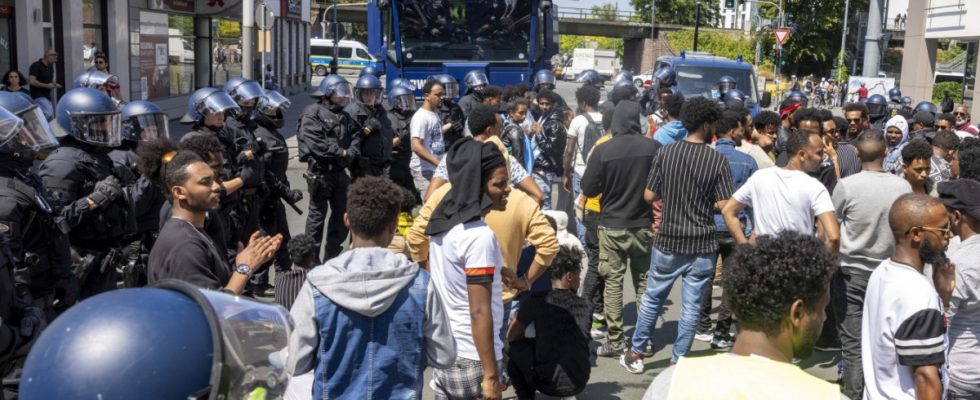It was not the first time that the Eritrea Festival in Giessen made negative headlines at the weekend. Opponents of the festival fought violent clashes with the police on Saturday. The officers were “massively attacked,” said a police spokesman, stones were thrown, bottles were thrown. A total of 26 officers were injured, 1,800 people checked and 125 criminal proceedings initiated, including for bodily harm. The police, the spokesman continued, used pepper spray and batons.
There have been riots at the festival before
The Hessian Interior Minister Peter Beuth (CDU) called on the federal government to summon Eritrea’s ambassador: “It must be made clear to the Eritrean government that Eritrean conflicts must not be fought on German soil.” And Federal Interior Minister Nancy Faeser (SPD) tweeted: “I strongly condemn the massive violence and rampage against police officers in Giessen.”
What happened? And where does the anger come from?
The Eritrea Festival is organized by the Central Council of Eritreans in Germany. Critics see the Central Council as a willing accomplice of the repressive regime in north-east Africa and the Eritrea Festival as a propaganda event. The organizers, on the other hand, speak of an apolitical family celebration.
The festival has taken place in Gießen several times, and there have been repeated riots. Last year, for example, opponents attacked other visitors with stones and poles and injured them. This is one of the reasons why the city tried to stop the festival this year. But the Hessian court decided that it could take place: the security concept was sufficient.
Eritrea, the “transnational nation”
Eritrea festivals like the one in Gießen harbor potential for conflict because the Eritrean diaspora is not only divided in Germany. On the one hand, there are those people and their descendants who left the country because they campaigned for Eritrea’s secession from Ethiopia during the 30-year war of independence. Today, this group is still mostly on the side of the government, which emerged from the 1993 independence movement, which finally succeeded. The group shows this, for example, at the Eritrea Festival in Giessen.
And there are those Eritreans who fled from this very government. The regime of the long-term ruler Isaias Afewerki, who recently made state visits to Beijing and Moscow, is one of the most repressive in the world. The main reason for the flight of hundreds of thousands is the so-called national service, which both men and women have to do in the military – for an unlimited period of time. “These people fled through the Sahara and across the Mediterranean and are now seeing how the government they suffered is being celebrated in Germany,” says Nicole Hirt of the German Institute for Global and Area Studies in Hamburg.
The festival represents the long arm of the Eritrean regime
In addition, the festivals are representative of the long arm of the regime in Asmara. Measured by its size, hardly any other country in the world has such a large diaspora as Eritrea. Hirt estimates that there are just as many Eritreans and people of Eritrean origin in other countries for the approximately five million inhabitants, especially in the neighboring countries. She speaks of a “transnational nation”. Around 75,000 people with Eritrean nationality live in Germany.
And as large as the diaspora is, the regime is reluctant to let go of its citizens beyond its own borders. Some refugees are caught and brought back, for example in Sudan. Eritreans who want to apply to embassies abroad must express their regret about the flight. And then there is the diaspora tax for Eritreans abroad. It is also driven in by putting pressure on relatives in the country. The tax is an important source of income for the regime. Another is the Eritrea festivals.

